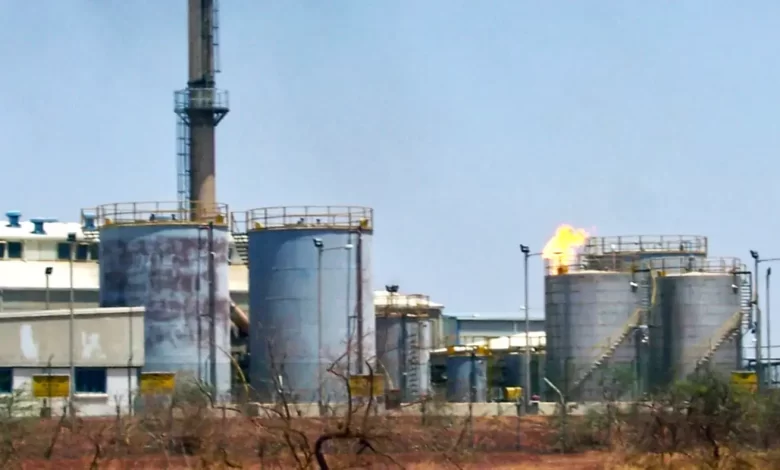How can Sudan avoid destruction of oil industry?

Sudan Events – Abdul Basit Idris
Oil industry in Sudan faces the specter of complete collapse and the cessation of facilities through a plan, and although its manifestations and results appeared to be evident with the April war, from the point of view of some, it remained a central target of an external plan that has been working for years to destroy the oil industry.
Growth Rates:
According to oil production and Sudan’s possession of strong infrastructure, represented by its possession of two refineries, transportation and supply lines, and a distinguished coastal location, it was able to achieve its highest growth rate of 10%, exceeding the expectations of the World Bank.
In 2008, the World Bank said in a report that Sudan rose to the 64th place globally and the eighth in the Arab world in terms of achieving high growth rates, according to a review by economic expert Dr. Mohamed Al-Nayer of the report.
Link to the South:
Sudanese oil project is linked to the state of South Sudan, even after the secession of the south and its monopolization of more than 70% of oil production, but the April 15 war prompted the Rapid Support RSF Militia to take refuge in the oil facilities and turn them into military barracks and logistical centers for supplying weapons and fuel and command rooms to manage its military operations in its war on the Sudanese state.
Addition to militia systematically sabotaged the oil pipelines, which led to the cessation of the export of South Sudan’s oil, which is naturally exported through Sudan.
According to the Minister of Finance in the Juba government, the cessation of oil exports caused South Sudan to lose $100 million per month, and also caused the non-payment of salaries to employees of his country’s government for more than 6 months.
Red Line:
In the past few days, Port Sudan hosted talks between the South Sudanese Presidential Advisor for Security Affairs, Tut Galwak, and the Sudanese Minister of Energy and Petroleum, Muhi El-Din Naiem Saad, regarding the process of re-exporting South Sudan’s oil. A press release issued by the ministry stated that Minister Muhi El-Din described the relations between Sudan and South Sudan as strategic, especially in the oil sector, stressing that the interests of the two countries in this sector are a “red line.” He revealed the directives of the President of the Sovereignty Council TSC for cooperation and coordination between the two countries until the work on resuming South Sudan’s oil exports is completed.
The Crisis in Juba:
Sudanese Minister of Oil’s indication, which implies a warning against negative media coverage of Khartoum-Juba relations or a warning not to harm Sudan’s strategic interests, particularly oil, which he described as a “red line,” does not seem more consistent with the facts of things.
The reality is that the sabotage of Sudanese national oil facilities and the halting of the export of southern oil are taking place with the participation of mercenaries from South Sudan fighting in the ranks of the militia, as attested by the report of the United Nations Committee of Experts.
Although the report itself ruled out the Juba government’s knowledge of the presence of those mercenaries, the Juba government is required to play a positive role in reducing the manifestations of pushing the southern militias to participate with Hemeti’s militia in killing Sudanese and destroying the country’s vital economic facilities, not only because of the neighborhood and interests that unite the two countries and peoples, but also in accordance with the Juba government’s commitments to the importance of preserving regional peace and agreements to eliminate negative force and combat terrorism.
However, it seems more important for the Juba government to realize that the (9) cooperation agreements reached between the Sudanese, including the security and oil agreements, are sufficient to maintain relations between the two countries and claim to complete their implementation and commitment to them.
Transitional .. The entrance to destruction:
Internally, the external plan through the transitional authority led by Dr. Abdullah Hamdok contributed to targeting the Sudanese oil industry, and Hamdok’s government deliberately ignored financing the maintenance of facilities and providing security at local production sites and carried out a large-scale bulldozing operation in energy institutions that targeted the displacement and separation of technical job competencies working in the sector, and an attempt to liquidate it through the Empowerment Committee, which was reflected in the decline in oil production rates to less than 60 thousand barrels per day compared to what it was before the beginning of the transitional period, where production remained between 75-80,000 barrels per day.
Targeting Companies:
Three major international companies operating in oil extraction and industry in Sudan had warned Hamdok’s government to leave the country and stop working in the Sudanese oil fields that were no longer promising for those companies that entered.



